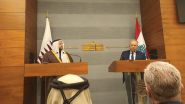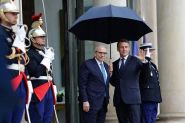
In policy, simplicity is valuable; naiveté is catastrophic. Lebanon has by now diluted UNSCR 1701 from dismantling Hezbollah’s militia, arms production, and illicit funding to merely surrendering “heavy and medium” weapons, or as U.S. Envoy Tom Barrack frames it: Hezbollah must hand over weapons that threaten Israel. Such oversimplification misses the root issue: Hezbollah’s very existence as a state within a state is an existential threat to the Lebanese state.
Hezbollah’s problem isn’t just its arsenal but also its ideology and actions. As an Iranian proxy, it rejects Lebanon’s nationhood. Its late leader, Hassan Nasrallah, once declared himself “a soldier” in the army of Iran’s Supreme Leader Ali Khamenei.
Viewing itself as part of a transnational Shia nation, Hezbollah disregards borders, intervening in Syria’s civil war to “defend” Shia shrines and in conflicts in Iraq, Yemen, and most recently, Israel—tying the ending of its war to a ceasefire in Gaza.
Unlike political parties, which Barrack imagines Hezbollah could become, the Iranian proxy ignores Lebanon’s national interests, dragging the country into foreign wars.
Hezbollah’s second major issue is its parallel state structure. Since Syria’s withdrawal in 2005, Hezbollah has dominated Lebanon through coercion, including assassinations and character-smearing campaigns.
To maintain control, Hezbollah doesn’t need “weapons that threaten Israel.” Personal arms, backed by a well-funded command-and-control structure, suffice to subjugate Lebanon.
Hezbollah also runs transnational networks fueling narcotics, money laundering, and terrorism, making Lebanon a pariah state. Even without “heavy” weapons, these activities persist, undermining Lebanon’s sovereignty and global standing. Disarming Hezbollah’s militia is only half the battle; dismantling its criminal networks is equally critical. Hezbollah’s transformation into a “normal” political party requires more than surrendering its arms.
Hezbollah is often mistaken for a “normal political party” due to its second-largest bloc in Lebanon’s 128-member parliament. Yet, the Nazi Party’s electoral success in Weimar Germany didn’t legitimize it; elections in Lebanon’s non-liberal system similarly prove little.
Hezbollah and its ally, Amal, claim to represent all 27 Shia seats, but this control stems from suppressing rivals in Shia-dominated districts. Opponents, barred from campaigning, cannot challenge their grip. Election laws, crafted by Hezbollah and Amal, cement this dominance—despite 17 percent of Shia voters opposing them in 2022, they secured no seats. If U.S. Envoy Barrack views Hezbollah’s parliamentary presence as proof of its political legitimacy, disarming its militia and dismantling its illicit state would reveal its true nature.
Some compare Hezbollah’s potential delisting to Hay’at Tahrir al-Sham (HTS) in Syria, delisted as a Foreign Terrorist Organization not for reforming but for becoming Syria’s de facto state. Lebanon, however, has an elected parliament, president, and government, however flawed by non-liberal elections.
Hezbollah’s state-within-a-state status undermines the Lebanese system, and its parliamentary facade must not obscure the need to dissolve its parallel structures. Unlike HTS, which filled a vacuum in Syria, Hezbollah sucks all the oxygen that the Lebanese require to breathe and live.
A nation can have only one state. Lebanon must choose: the Lebanese state or Hezbollah’s parasitic state. The two cannot coexist. Most Lebanese support their state and want Hezbollah’s parallel institutions dissolved—not only the militia disarmed.
For Lebanon to thrive, Hezbollah’s state-like structures must be eradicated. The Lebanese government may be too timid or reluctant to confront the pro-Islamist Iran organization, but the U.S. should not indulge Lebanon’s excuses.
America helped build a global system rooted in the nation-state. Preserving Lebanon’s sovereignty aligns with the interests of the U.S., Israel, and the international community. The sooner Envoy Barrack recognizes that disarming Hezbollah is only a first step—not the solution—the better for Lebanon and the world.




Comments